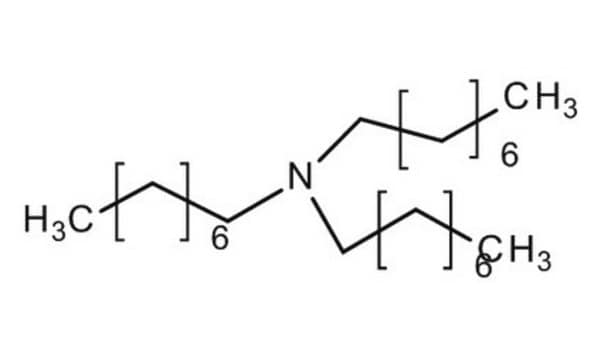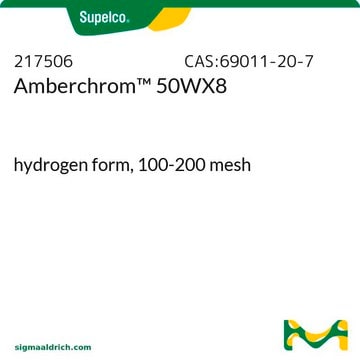471313
Tributylamine
≥98.5%
Synonym(s):
Tri-n-butylamine
About This Item
Recommended Products
vapor density
6.38 (vs air)
Quality Level
vapor pressure
0.3 mmHg ( 20 °C)
2.4 mmHg ( 55 °C)
Assay
≥98.5%
form
liquid
autoignition temp.
410 °F
expl. lim.
6 %
refractive index
n20/D 1.428 (lit.)
pH
10.2 (25 °C, 0.1 g/L)
bp
216 °C (lit.)
mp
−70 °C (lit.)
density
0.778 g/mL at 25 °C (lit.)
SMILES string
CCCCN(CCCC)CCCC
InChI
1S/C12H27N/c1-4-7-10-13(11-8-5-2)12-9-6-3/h4-12H2,1-3H3
InChI key
IMFACGCPASFAPR-UHFFFAOYSA-N
Looking for similar products? Visit Product Comparison Guide
Related Categories
General description
Application
- An extraction solvent with CHCA (α-cyano-4-hydroxycinnamic acid) for the selective phospholipids (PLs) extraction from EVOO (extra virgin olive oil) and HO (hazelnut oil).
- A hydroxylating agent in the synthesis of spinel nickel ferrites (NiFe2O4) nanoparticles (NPs).
Features and Benefits
Signal Word
Danger
Hazard Statements
Precautionary Statements
Hazard Classifications
Acute Tox. 1 Inhalation - Acute Tox. 2 Dermal - Acute Tox. 4 Oral - Skin Irrit. 2
Storage Class Code
6.1A - Combustible acute toxic Cat. 1 and 2 / very toxic hazardous materials
WGK
WGK 1
Flash Point(F)
145.4 °F - closed cup
Flash Point(C)
63 °C - closed cup
Certificates of Analysis (COA)
Search for Certificates of Analysis (COA) by entering the products Lot/Batch Number. Lot and Batch Numbers can be found on a product’s label following the words ‘Lot’ or ‘Batch’.
Already Own This Product?
Find documentation for the products that you have recently purchased in the Document Library.
Customers Also Viewed
Our team of scientists has experience in all areas of research including Life Science, Material Science, Chemical Synthesis, Chromatography, Analytical and many others.
Contact Technical Service













